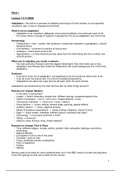Week 1
Lecture 11/11/2020
Adaptation = the action or process of adapting one thing to t with another, or suit speci ed
conditions, esp. a new or changed environment.
What is not an adaptation
- Adaptation is an extended, deliberate, announced revisitation of a particular work of art.
- For some critics a change of medium is required for it to be an adaptation, but not for her.
Terminology
- Transposition = text > screen, new audience; maybe also relocation in geographic, cultural,
temporal terms.
- Commentary = comment on politics of source text.
- Analogue = stand-alone work of art.
- Appropriation = a more decisive journey away from the informating text into a wholly new
cultural product.
When you’re adapting, you create a network.
- You lose authority, Atwood wrote the original Handmaid’s Tale, then there cam a Hulu
adaptation and Atwood then wrote the Testaments with some background info of the Hulu
adaptation.
Hutcheon
- If we don’t know it’s an adaptation, we experience it as we would any other work of art.
- If we do know the source text, it’s a kind of oscillating experience.
- Adaptations are about the ways that we tell each other the same stories.
Adaptations are in uenced by the main text but also by other things around it.
Reasons for change: Medium
- In the dark, no going back
- Length → fewer characters, simpler plot, di erent pacing, compress/expand time
- Interior monologue → act it / voice over / images (dream) / music
- Third person narration → voice over / music / silence
- Visual options → colour, setting, camera angle, panning, special e ects
- Auditory options → music, regional accents
- Money & audience expectations → happy ending, indiginise, choice of actor
- Gaps → black screen, intertitles, di erent actors, motivation still clear?
- Chronology → move back and forth in time?
- Telling → showing?
- Author’s voice: humour, irony, verbal mastery?
Reasons for change: Time & Place
- Time: di erent religion, morals, politics, gender roles, sensuality, ideology, economics,
technology . . .
- National identity
- Conception of art or role of the artist
- Focaliser / point of view
- Focus, emphasis (centre vs periphery)
- Point of departure
- Ending
- Setting
Women used to be there for men’s entertainment, but in the BBC version of pride and prejudice,
Colin Firth getting his shirt wet is there for the women.
1
ff fl ff ff fi ff fi
, Adaptation
- Adaptation is repetition, but repetition without replication.
- Adapting a formal entity:
- Medium: text (novel) → lm . . .
- Time: early → later
- Place: (national) culture → (national) culture
- Creation & interpretation
- Intertextual, inherently palimpsestuous
Palimpsests = piece of parchment where the top layer has been scraped o and over written, yet
the old text still shines through, this is similar to an adaptation.
Fidelity or the quality of being faithful
- Woolf
- All the famous novels of the world, with their well-known characters and their famous
scenes, only asked, it seemed, to be put on the lms.
- The cinema fell upon its prey with immense rapacity, and to the moment largely subsists
upon the body of its unfortunate victim.
- Casie
- as a goal (from the perspective of lm production)
- as evaluation (from the perspective of reviews)
- as comparison (from the perspective of adaptation studies)
Central Questions
- What choices have been made, why these?
- What is the e ect of these choices?
- What do the choices and changes tell us about the medium, makers, society, the audience?
- How was the adaptation received, why thus?
The Practice of Adaptation Studies
- A separable content which may be detached and reproduced
- The lack of awareness [. . .] that changes are inevitable the moment one abandons the
linguistic for the visual medium.
McFarlane’s theory on comparing novels
- Non-transferable elements, e.g. omniscient narration, enunciation
- Transferable elements, e.g. plot, narrative
- Cardinal functions or hinge-points > delity
- How are they transferred?
- In uence of medium & context?
J.M. Barrie
- Scottish novelist who moved to London.
- Befriended 5 boys who became his friends and he became their guardian later on.
- Peter Pan started as a story he told to these boys, he compiled that into a novel which was
called the boy castaways.
- It’s a story told by adults to children.
- Peter Pan doesn’t want to grow up, he takes the Darling family along to Neverland. When
they y away to Neverland, time stops.
- When they get back home they nally grow up.
Peter Pan
- Reference to a greek god, Pan.
- Playing the pipes, based on this greek god of fertility.
- They y o to Neverland.
- The children may be gay and innocent, but as an adult they would not be able to do this.
- You can only go to Neverland if you’re a child, believe in fairies and are able to y. But you’re
also heartless because of it.
- They are children growing up who are learning to be a part of society.
2
fl flfl
ff ff fi fi fi fi fi ff fl




